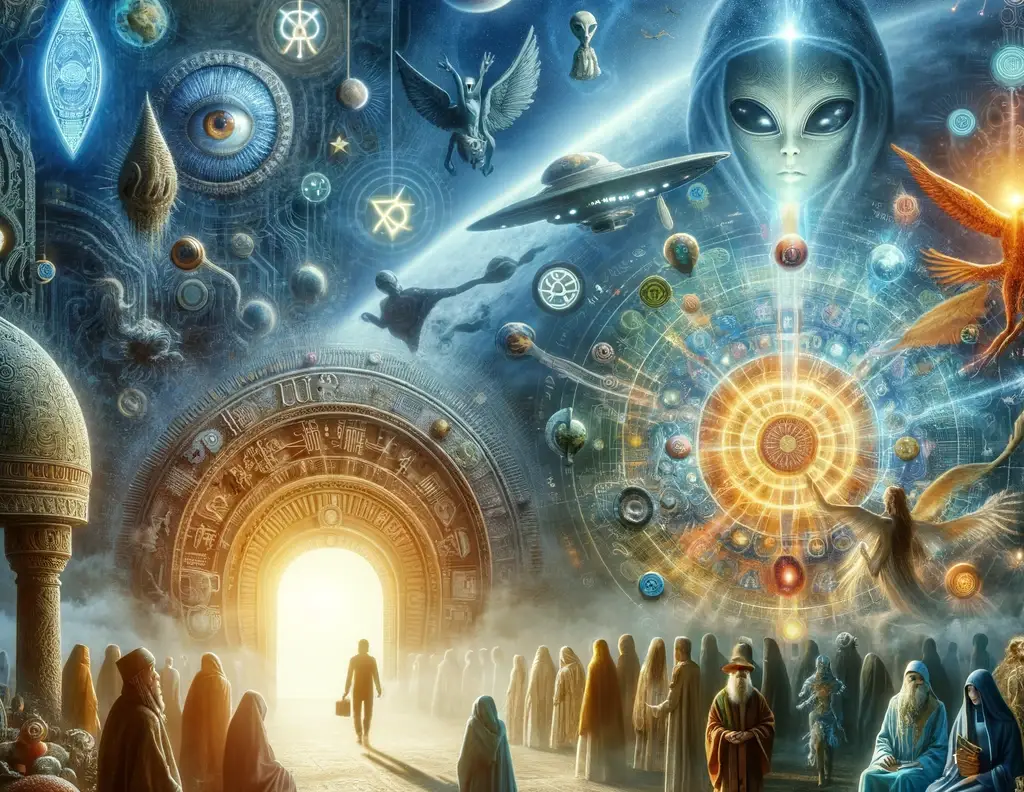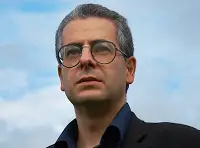
Where the lines between science fiction and scientific possibility blur, a fascinating theory has emerged at the crossroads of ufology and existential philosophy. It suggests that our reality, with its vast diversity of world religions and beliefs, might be nothing more than a sophisticated simulation controlled by extraterrestrial beings. This notion, endorsed by leading UFO expert Nick Pope, introduces a captivating explanation for the complex tapestry of human spirituality and the enduring mystery of UFO sightings.
Nick Pope, a former head of the British Government’s UFO project, articulates a compelling narrative that our perceived universe could be a construct—a cosmic game designed by alien intelligences. This simulation theory, as it’s known, posits that the myriad of religious beliefs on Earth might be the result of different programmers (or “designers”) contributing to the simulation’s code. Each designer, with their unique ideologies and potential flaws, crafts a distinct aspect of our world, leading to the rich variety of religious experiences and doctrines witnessed throughout human history.
The implications of this theory are profound, offering a radical perspective on the nature of existence and the origins of religious diversity. It suggests that what we consider as divine intervention or spiritual revelation could be interpreted as glitches or intentional features embedded by our extraterrestrial programmers. This viewpoint not only challenges conventional religious narratives but also invites us to reconsider the authenticity of our experiences and beliefs.
“God Versus Aliens,” a documentary featuring Pope and other UFO experts, delves deeper into this hypothesis. It explores the potential for life as we know it to be a simulation, controlled and observed by beings far more advanced than ourselves. The film provocatively suggests that the concept of a higher power, central to many religions, might actually refer to an alien race with the technology to fabricate universes.
Such a revelation, if ever confirmed, would undoubtedly send shockwaves through the fabric of society, especially the religious domain. Pope speculates on the varied reactions humanity might face, from the denial of religious leaders to the existential crisis among the faithful. He raises intriguing questions: Was religion a deliberate insertion into the simulation, or did it emerge as a spontaneous byproduct? And how would the discovery of our simulated existence reconcile with the deeply ingrained beliefs held by billions?
The documentary also touches on historical UFO sightings and encounters, framing them as possible interactions with the architects of our simulation. These events, often dismissed or shrouded in secrecy, could be evidence of our creators’ influence or experiments within the simulation.
The theory ventures into speculative territory when considering the role of anomalies within religious texts. Pope humorously notes instances in holy scriptures that seem absurd or out of place, suggesting they could be “Easter eggs” left by the programmers—a concept familiar to anyone who’s played a video game.
While the simulation theory remains a subject of debate and skepticism, it undeniably opens up a Pandora’s box of philosophical and theological inquiries. It forces us to ponder the very foundation of our beliefs, the nature of our universe, and our place within it—whether as autonomous beings or mere characters in an elaborate extraterrestrial orchestration.
As we continue to witness unprecedented UFO sightings and encounters, the quest for understanding our existence and the potential influence of non-human intelligences becomes more pressing. The simulation theory, with its bold assertions and imaginative insights, offers a unique lens through which we might explore these enduring mysteries.
Whether we are living in an alien-controlled simulation or not, the conversation around this theory enriches our pursuit of knowledge, challenging us to question the known and venture into the unknown. It beckons us to look up at the stars, not just in wonder, but in search of answers to the ultimate question: What is reality?


Nothing would surprise me. Just another theory as good as any other. It seems a lot of trouble for aliens to go to to create an virtual reality, hologrammes. But we know solid reality does not exist as we believe it does.All matter is composed of atoms, electrons, neutrons, protons, just packets of energy like the string theory. Each atom has massive internal space differences between its component parts, relativley speaking. It reminds me of ‘alien interview 2’, real or fiction. We will never now the truth.
You’re sixty-seventy years too late. Those of us born in the 1930s and 1940s (l’m 1945) were reading these ideas written by far better writers than you mimics, as we carried the comic books they hid inside, bought on local market stalls, into bed. To read by candlelight. In the early 1960s, my 61 years old mother-in-law, a tiny 4’10” over active walking keg of dynamite, bought up every new episode of these picture story comics on our local market. And distributed them to her two son’s and one daughter’s houses on a weekly Saturday morning visits. And every night at 9pm, took her own share to bed in candlelight. To read all alone. Being very recently upgraded by her landlord to electricity, she feared switching it on. I personally interceded to prevent her putting her new electric iron on the old gas stove/cooker, on top of flames. She was terrified of electricity, but seriously understood the Matrix idea, and had no fears of paranormal. Living in a haunted vicarage, alongside the late vicar. He was annoying for creating draughts, wouldn’t leave the front door shut, unlocked and pushed it wide every night, because in life, he had an ever open door to poorer parishioners. I too read all these science fiction alien ideas, as ma brought them home, but the difference is, l’ve seen UFOs for real lifelong, since 1949 when l was four. As did our whole street the first time. I’ve seen and interacted with ghosts lifelong. I’ve had premonitions lifelong, and all come true, and l’m also named by the Bishop of my diocese, since 1973, as a Medium and Exorcist, and was front paged for it. I and my late tiny ma-in-law, wrote the entire script of your opus, long before all of you were born. And no, it never damaged hers, or my, faith in God, and belief He’s in control. Stop filching ideas as if your invented them, you didn’t, your sixty years too late.